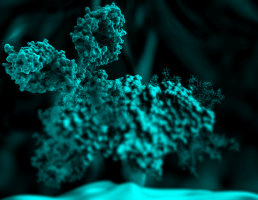
SAR650984 (SAR) is an anti-CD38 antibody that has shown single-agent activity in Phase I testing among heavily pre-treated myeloma patients.
In this Phase Ib trial, researchers added escalating doses of SAR to a standard regimen of lenalidomide and dexamethasone in patients with relapsed or treatment-resistant multiple myeloma.
The goals of this study were to identify the maximum tolerated dose of SAR in combination with lenalidomide and dexamethasone, and to assess preliminary efficacy of the regimen. Thirty-one patients with relapsed or treatment-resistant disease were enrolled, with 13 patients receiving escalating doses of SAR650984 and 18 patients receiving the highest dose. After a median of nine months of follow-up, 58 percent of patients responded to treatment. Progression-free survival was 6.2 months.
The response rate was slightly higher in patients receiving the highest dose of SAR. Responses were observed in patients who had previously relapsed or demonstrated resistance to lenalidomide or other similar drugs (called immune modulators). While no increased toxicity was observed, the most common adverse events reported included mild fatigue, nausea, diarrhoea, blood count suppression, and upper respiratory tract infection. Two patients discontinued treatment due to infusion-associated reactions.
“The addition of this antibody made a significant difference in outcomes among these patients, even among those who had previously relapsed or did not respond to initial therapy with immune modulator drugs,” said lead study author Thomas Martin, MD, of the University of California, San Francisco.
“Our next steps are to further evaluate even higher doses of the antibody and to perform a randomised study in the hopes of showing that treatment with the antibody plus immune modulator drugs is better than treatment with immune modulators alone.”
Watch the press conference and the interview for more.
Source: ASH
The World Cancer Declaration recognises that to make major reductions in premature deaths, innovative education and training opportunities for healthcare workers in all disciplines of cancer control need to improve significantly.
ecancer plays a critical part in improving access to education for medical professionals.
Every day we help doctors, nurses, patients and their advocates to further their knowledge and improve the quality of care. Please make a donation to support our ongoing work.
Thank you for your support.